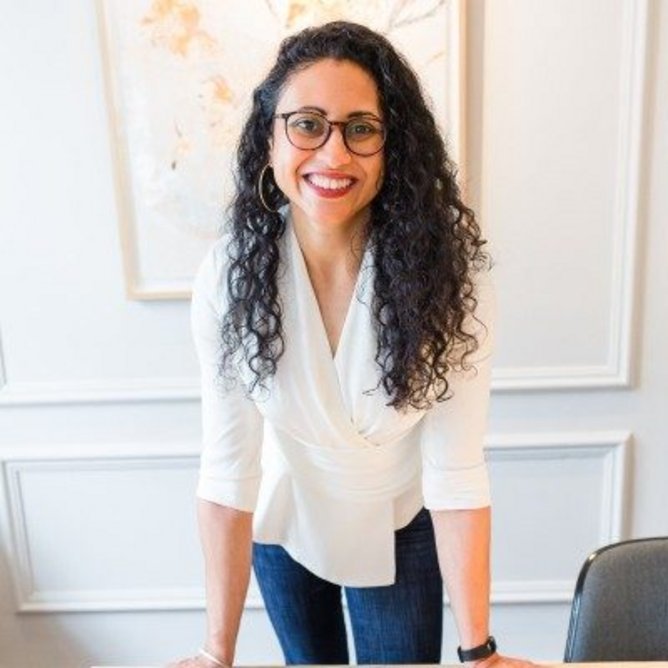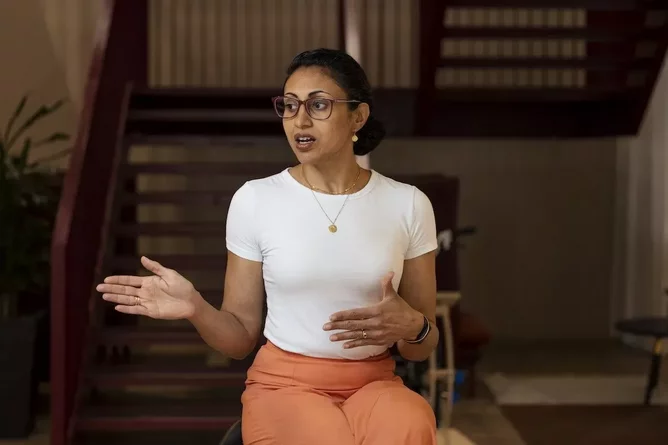
Becoming a CIA agent is something that many of us dream about as children, but Rupal Patel made it her reality. After a seven-year career at one of the world’s most exclusive organisations, Rupal decided to trade in her badge for business, founding and becoming CEO of Entreprenora and Blue Infinity Property Group.
This is the story of how she got there.
Growing up
Like many children, Rupal grew up with two key role models: her mum and her dad. From an early age, Rupal was inspired by their work ethic and life philosophy, which guided her throughout her career and personal life. “My mum raised four kids, had a busy career as a doctor and played a big part in helping our extended family settle in the US from India,” Rupal says. “She became my main source of inspiration and instilled in me that women have to work harder to prove themselves and get ahead.
“Growing up, I was aware that as a woman, and a woman of colour, my journey would be different just because of those two data points. To prepare me for this, my mum taught me to work on myself, never take “no” for an answer, and never question my competence. Even now, at almost 75 years old, she is still running her own paediatric practice in New York.
“My dad was my biggest supporter throughout my career. He’s always been entrepreneurial and encouraged me and my siblings to be financially independent, and he pushed me to explore my career choices as long as I was following a purpose. In fact, when I was two or three years into my career at the CIA, I remember telling him that I couldn’t wait to wake up at 5am and get to work in the morning. He told me: “If you find something that gets you out of bed with excitement, hold on to it for as long as you can.”
The CIA
After earning her Master’s in International Affairs, Rupal was presented with an opportunity to work for one of the most exclusive organisations on the planet: the CIA. “The job ticked all the right boxes for me: it provided a sense of purpose, it allowed me to contribute to a greater mission and it required me to dive deep into specific issues of global importance. It felt like they were paying me to be a nerd,” Rupal jokes.
“My main role was to synthesise and analyse all of the information we had on the US’s war efforts in Afghanistan. I would digest all of the intelligence that we were getting – whether that was secret information or public knowledge – and compile it into reports and briefings for the people who needed it. This included President Bush, President Obama, four-star generals, and diplomats, for example.”
You may think that working at the CIA as a woman would present its own set of challenges, but Rupal doesn’t necessarily agree. “I was very good at being tactically ignorant,” Rupal says. “So, yes, I knew being a woman, a civilian, a person of colour, or the combination of all three might colour the way that others saw me or tried to treat me. But I didn't let that noise affect how I delivered my job. I knew whatever prejudice others had, I couldn’t control it. I let that be on them. I was in control of how I delivered my job, so I made sure that I was prepared for every context. Were there elements of sexism and racism? Of course, but I wouldn’t let it stop me from being great at what I did.”

Lessons from the field
When working in intelligence, everything is secret to the public. And as you can probably imagine, being on the inside taught Rupal a lot of valuable lessons. “In the CIA, our job is to operate in the shadows, and most of what we do is classified ,” Rupal explains. “So when the media misinterprets or mischaracterises what we are doing, it can be really frustrating because we can’t fight back with the classified truth. Often press pieces are full of holes, not because they are being intentionally reckless (though sometimes that happens) but because they don’t, and can’t, have the full picture. It’s classified.”
And sometimes the press can be a bit sensationalist. “For example, when I was in Afghanistan, yes there was an active war going on, but watching the news or reading the tabloids made it seem as if bombs were constantly falling like rain from the sky, when the reality was much more nuanced.
“This has made me realise how important it is in every aspect of our lives to be humble about our opinions and beliefs; we can have very strong opinions on various topics, but we rarely have all the information or the full picture. We all need to have the humility to be proven wrong, and at least admit there is a possibility that there’s something out there that could challenge our deepest held convictions. We can never know it all, and there will be others around us that can contribute something to our beliefs or views because they’ll have different pieces of the puzzle that we don't necessarily have.
War zone training
As you can probably imagine, Rupal needed to undergo extensive training from the CIA, especially before she was deployed to war zones. Although this intense training taught her life-saving skills, it also equipped her with new ways of processing life. “As we were operating in environments where we didn’t know what would be thrown at us – quite literally – our trainers wanted to train us to survive in hostile environments,” Rupal explains. “This taught me to always be aware of my surroundings and pay close attention.
“One experience that will always be in the forefront of my mind was an exercise that took place in the middle of the night. My instructor and I were driving when we reached a temporary checkpoint. All of a sudden, I heard shouting and saw two balaclava’ed men with guns pounding at the vehicle door. I looked at my instructor, and froze. The, mock-terrorists pulled me out of the door, slammed me against the car and said, ‘click, you’re dead’ – if that were a real-life scenario, I would have been killed.
“When I slumped back in the car, my instructor asked me why I didn’t move my foot from the clutch to the accelerator – the car was still in gear, so we could have gotten away. At that moment, I learnt a hard lesson about my survival instincts: I didn’t have any! My response was to freeze rather than react, so I knew I needed to train that habit out and learn a different reaction, build a different instinct. That was what our training was all about: refining and recalibrating our instincts.”
The tradeoffs of being a woman at the CIA
As we talked about Rupal’s time at the CIA, she reflected upon her career path and the many accomplishments she had obtained. “One of the most common questions I receive is whether I would want my daughters to join the CIA and follow in my footsteps, should they wish to,” Rupal shares. “And I always say absolutely, yes!
“The organisation has such a great sense of camaraderie, so you join knowing no one will be left behind. Of course, it can be an intimidating industry, so more progress does need to be made. It can be especially challenging for women. The role requires a lot of travelling, which can put a strain on relationships. Many women who do pursue a career in this high-octane world struggle to find partners who will accept this way of living, whereas sadly, men don’t have to worry about the same thing. A lot more progress is needed to allow women to reach the top without neglecting other aspects of their lives, but I think we are going in the right direction.”

Transitioning to the Business World
Around two years before Rupal decided to leave the CIA, she began to feel that she was ready for another next challenge. After some thoughtful reflection and weighing other options, she decided to study for her MBA. “While I was studying, I realised I didn’t want to work for somebody else,” Rupal says. “I wanted to put myself to the ultimate test, to see whether I could launch a business.
“My first venture was a real-estate business, of which I’m still the head. It started during the second year of my MBA, and it slowly grew from there. The process of becoming a business owner was stressful and lonely. You hear so many stories about how sexy the entrepreneurial lifestyle is, but it couldn’t be further from reality – at least, when you start up. Most businesses fail in the first five years, but I chose to remain tactically ignorant to the enormity of the challenges that were ahead of me; my tactic was to live in the moment and deal with the challenges when they came instead of obsessing over what-ifs, but it was still really, really hard.
“One of the main things I struggled with was going from a social environment where I was around a lot of people to being at home by myself, all the time. I also had to redefine my sense of self, because we often associate ourselves with the organisation we’re attached to. When we leave that university or business, that sense of identity is suddenly taken away, and it takes a lot of getting used to.
One of the main things that kept me going during those early difficult years was my stubbornness and being able to keep my eye on the bigger picture. I told myself that I was the only one who would decide whether I quit or kept going – I wouldn’t let circumstances, challenges, or other factors outside of my control dictate that to me – so I kept going.
“And through the process of growing and scaling this business, I rediscovered themes from my previous life – such as my passion for developing an expertise and sharing that knowledge others who could benefit from it – that evolved into my work now as an advisor, strategist, consultant, author, and speaker.
Entreprenora
Rupal is a self-professed geek. Researching, analysing and sharing information have been consistent themes in her life, and she found ways to build that into her second venture, Entreprenora. “As I was learning how to run and grow my real estate business, I made a point to share my hard-won (and sometimes humorous!) lessons with other people and I kept being asked for advice from other founders and corporate leaders,” Rupal says. “I loved helping other leaders, so I started a second company specifically to help businesses and executives achieve big ambitions and make their vision a concrete reality.
“A lot of this requires 1:1 work with leaders, who I help to uncover their unique leadership style and show them how to tangibly leverage their strengths to build their businesses and get the best from their teams. Now, more than ever, leaders are questioning the notion of being the sterotypical shouty, alpha boss and asking if there’s another way. I’m here to say there definitely is.”
Now
With two successful businesses under her belt, Rupal can look back and be proud of her CIA to CEO journey. “I’ve developed a deep resilience that was forged in fire during those challenging early years of my first business,” she explains. “Now, I’m able to confront challenges more quickly and with less inner turmoil. The saying, ‘at every level there’s a different devil’, couldn’t ring more true. There will always be new challenges to face in life, but what’s important is that you develop your resilience muscle to handle these situations better.
“My next big project is to launch my book, From CIA to CEO, in the US (it’s already a best-seller around the world!). The book highlights my lessons and experiences from the CIA, and shows how anyone can use the same tools and techniques in their day-to-day lives to achieve anything they want to.
“From a business perspective, I’m currently delivering leadership programmes within large organisations – from banks to retailers to government agencies – to help them build their pipelines of female leaders, as many organisations are still lagging in getting high-calibre women into senior, board, and executive roles. I’ve also launched an executive wellbeing programme to arm leaders with the tangible tools they need to manage their time, energy, and emotions, so they they avoid burnout and perform at their best which will also create positive ripple effects throughout their organisations.
“Wherever my path takes me, I always make sure to remember how fortunate I am. Being born in the US and being born into my family were two of the luckiest things that could have happened to me. I did nothing to “deserve” it. It just happened. And so, whatever I do, wherever I go, I am keenly aware that I owe it to all of the people who don’t have the same freedoms and opportunities – from the women in my own ancestry to the billions of people in the world today who don’t live in free countries or with guaranteed rights – to live my life to the fullest, to live every day as an adventure, and to never take any of it for granted.”






